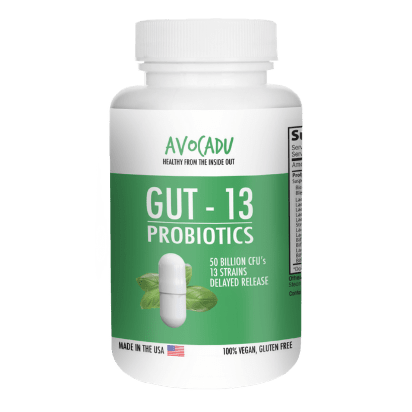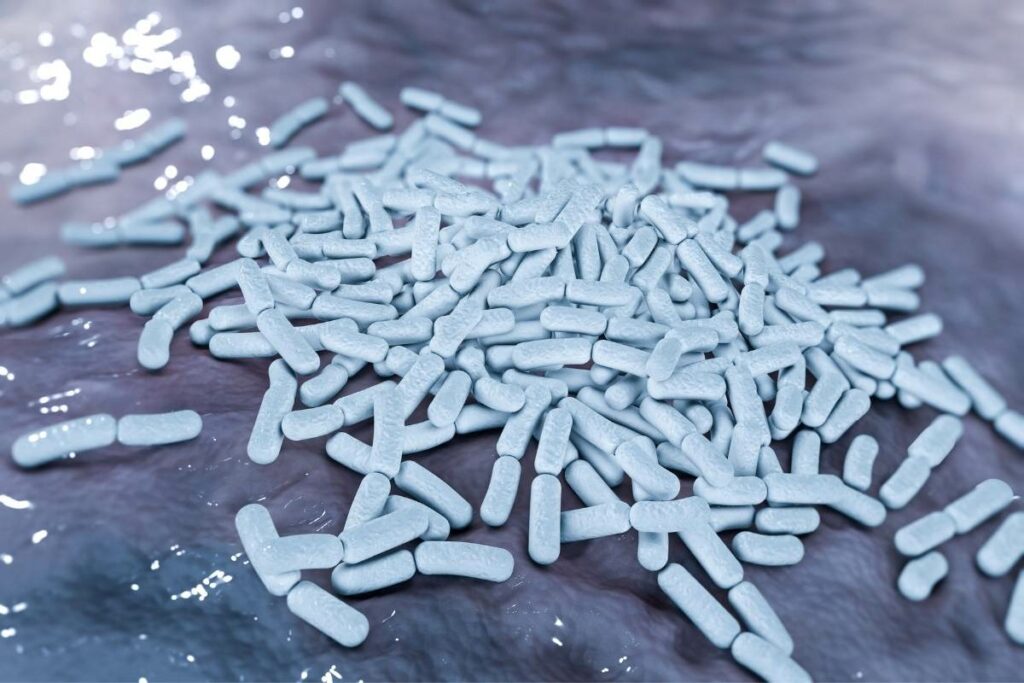This post may contain affiliate links, which helps keep this content free. Please read our disclosure for more info.
If you’ve been feeling run down and like something is just not right, you may have a candida overgrowth. Candida is a fungus that lives in the gut, and under certain conditions can grow out of control.
Probiotics are beneficial bacteria that help to keep candida in check, and when taken regularly they can help to get your gut back into balance. In this article we will discuss what candida is, how probiotics can help, and the best probiotics for candida.
Best Probiotics for Candida

If you’re looking for the best probiotics for candida, look no further!
Candida is a type of yeast that naturally occurs in the body, but can overgrow when the immune system is compromised or when good gut bacteria levels are low.
Probiotics are live microorganisms that can help to restore balance in the gut, and are an essential part of any natural candida treatment plan. So which probiotics are best for candida?
There are many different probiotic strains that can be beneficial for candida, but some of the most effective include Lactobacillus acidophilus, Lactobacillus rhamnosus, and Bifidobacterium longum.
Avocadu’s Gut-13 Premium Probiotics includes these 3 strains, plus 10 more!
These strains have been shown to help reduce candida overgrowth, promote a healthy immune response, and improve gut barrier function.
Probiotics are available in many different forms, including capsules, powders, and fermented foods. The best probiotic for candida will depend on your individual needs and preferences.
However, all three of these strains can be found in high-quality probiotic supplements. So if you’re looking for the best way to fight candida and restore gut health, consider adding a probiotic supplement to your daily routine.

Avocadu’s Gut-13 Probiotics
In a recent study, women taking probiotics lost 50% more weight than those who did not. Your gut health and how well you absorb nutrients MATTERS. Don’t miss out on getting in a daily probiotic. Click here.
What is Lactobacillus Acidophilus?
Lactobacillus acidophilus helps to restore the natural balance of gut bacteria and prevent candida overgrowth by producing lactic acid.
This acidic environment makes it difficult for yeast to proliferate. In addition, lactobacillus acidophilus also produces enzymes that break down sugars and other carbohydrates that yeast feeds on.
For these reasons, lactobacillus acidophilus is an effective probiotic for preventing and treating candida overgrowth.
What is Lactobacillus Rhamnosus?

Lactobacillus Rhamnosus is a naturally occurring probiotic that is found in the human gut. This probiotic has many beneficial effects, including the ability to inhibit the growth of candida.
Lactobacillus Rhamnosus helps to keep candida in check by preventing it from attaching to the walls of the gut and by producing enzymes that kill the yeast.
In addition, Lactobacillus rhamnosus GG inhibits the growth of Candida albicans by competing for space and nutrients.
Lactobacillus Rhamnosus has also been shown to boost the immune system and help to prevent diarrhea.
What is Bifidobacterium Longum?
Bifidobacterium longum is a probiotic bacteria that helps maintain the balance of organisms in the intestine. It does this by producing lactic acid, which creates an environment that is hostile to yeast.
In addition, Bifidobacterium longum also helps to break down food and absorb nutrients. This is important because candida overgrowth can often lead to malabsorption of nutrients.
Furthermore, Bifidobacterium longum also helps to stimulate the immune system, which can help to fight off candida infections. Thus, Bifidobacterium longum is an important probiotic bacteria that can help to prevent and treat candida overgrowth.
What is Candida Overgrowth?
Candida overgrowth is a condition where there is an overgrowth of the Candida albicans fungus.
This fungus is normally found in small amounts in the digestive tract, mouth, and vagina. However, when there is an overgrowth, it can lead to various symptoms, including fatigue, headaches, digestive issues, and skin problems.
In some cases, Candida overgrowth can also lead to more serious health problems, such as diabetes and Crohn’s disease.
While Candida overgrowth is often treated with antifungal medications, natural therapies, such as diet and probiotics, can also be effective in restoring balance to the gut flora.
What Causes Candida Overgrowth?
There are many things that can contribute to an overgrowth of Candida. A diet high in sugar, for example, can provide the perfect environment for yeast to thrive.
Similarly, a diet that is low in beneficial bacteria can also lead to an overgrowth of Candida. Other factors that can contribute to Candida overgrowth include: a weakened immune system, a history of antibiotic use, and chronic stress.
While many people believe that Candida is only a problem for women, the truth is that men can also suffer from an overgrowth of yeast. In fact, Candida can cause a wide range of problems for both sexes, including: fatigue, digestive issues, skin rashes, and mood swings.
If you suspect that you may be suffering from Candida overgrowth, it’s important to speak to your doctor. Only a medical professional can confirm a diagnosis and help you develop a plan to get rid of the yeast.
What are the Symptoms of Candida Overgrowth?

Many people suffer from vaginal yeast infections, thrush, and digestive issues, not realizing that they may have a Candida overgrowth.
Candida is a type of yeast that lives in your gut, and while a small amount is necessary for proper digestion, an overgrowth can lead to serious health problems.
Symptoms of Candida overgrowth include
- fatigue
- headaches
- brain fog
- digestive issues
- skin rashes
- vaginal infections
- leaky gut
- oral thrush
Left untreated, Candida can enter your bloodstream and cause life-threatening illnesses. So if you’re feeling exhausted and bloated all the time, it might be time to get checked out for Candida.
Can probiotics get rid of Candida?
Probiotics are live microorganisms that are similar to the good bacteria found in the human gut.
When taken in sufficient quantities, they can help to restore the balance of bacteria in the gut, which can lead to a number of health benefits.
While probiotics are not a cure for Candida, they can help to control its symptoms by reducing the amount of yeast in the gut.
In addition, probiotics can help to stimulate the immune system and reduce inflammation, both of which are important in fighting off infections. As a result, probiotics may be an effective treatment for those who suffer from Candida.
How much probiotics should I take for Candida?
The amount of probiotics for Candida you should take really depends on the severity of your infection.
For mild cases, a single daily dose of 10-20 billion CFUs should be sufficient. However, more severe infections may require a higher dosage, up to 60 billion CFUs per day.
In addition, it’s important to choose a probiotic supplement that contains a variety of different strains of bacteria. This will help to ensure that the beneficial bacteria are able to colonize the gut and crowd out the Candida.
Avocadu’s Gut-13 has 50 Billion CFUs and 13 Different Live Strains + Delayed Release!
It’s important to remember that probiotics are just one part of the puzzle. A healthy diet and lifestyle are also essential for keeping Candida in check.
How long does it take to cure Candida overgrowth?
This is a difficult one to answer. There are a number of factors that can affect the length of time it takes to cure Candida overgrowth, such as the severity of the infection, the individual’s overall health, and the specific treatment plan that is being followed.
In general you should allow at least 3-6 months for the Candida to clear your system. This may seem like a long time, but it is important to remember that Candida overgrowth is a chronic condition that often takes time and diligence to overcome.
With the right approach, however, it is certainly possible to cure Candida overgrowth and restore your health.
Are there Foods that Fight Candida?

This pesky yeast infection can cause all sorts of problems, from fatigue and digestive issues to rashes and brain fog. But the good news is that there are certain foods that can help fight candida. Here are some of the best:
- Garlic: This potent little vegetable is a powerful antifungal, making it ideal for fighting candida. Add it to your cooking or take it in supplement form.
- Coconut oil: Another great antifungal, coconut oil can help kill candida and promote a healthy gut environment. You can take it internally or use it in cooking.
- Probiotics: These friendly bacteria are essential for gut health, and they can also help fight candida. Look for a quality probiotic supplement or eat fermented foods like kimchi and sauerkraut.
- Greek yogurt: This creamy food is packed with probiotics, making it great for gut health. Choose plain yogurt with live cultures for the most benefit.
These are just a few of the best foods for fighting candida!
Click here for more info on Foods that Fight Candida!
Avocadu’s Gut-13 Premium Probiotic
We named our probiotics Gut-13 because they contain 13 different gut-healing strains of bacteria. They also…
- Are vegetarian
- Contain 50 Billion CFU’s Per Serving
- Have Delayed Release for Deeper Support
- and are Made in the USA
While our probiotics are not available on Amazon at this time, we do offer free shipping to our customers in the U.S.!
Take back your digestive health, immune function, ability to lose weight, and get balanced flora with Avocadu’s premium probiotic, Gut-13!
Related Articles
- 10 Candida Overgrowth Symptoms + 3 Steps to Naturally Cure It!
- 10 Foods That Help Heal Your Leaky Gut
- How I Healed My Leaky Gut, IBS, and Digestive Problems in 2 Months
- 5 Steps to Fix Leaky Gut and Heal Autoimmune Problems
- 10 Warning Signs You Have an Unhealthy Gut + What to Do About It
Get the FREE 21-Day Training Guide!

Jumpstart your weight loss with this FREE fast fat loss training!






